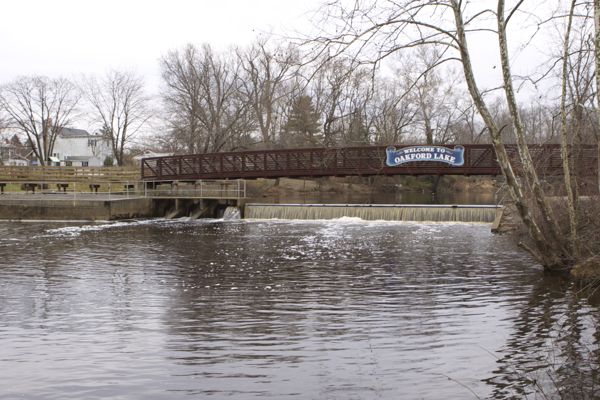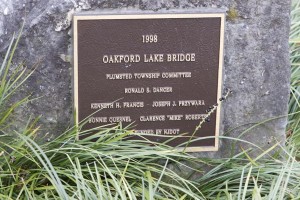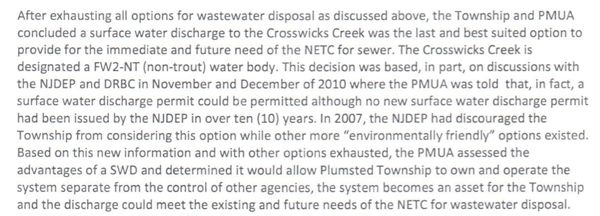Allowing Decline in Water Quality Could Destroy What’s Left of Rural NJ

Oakford Lake, formed by Crosswick Creek, in downtown New Egypt – severely polluted by failing septics, illegal cesspools & discharges, & storm water outfalls
[Update: 12/223/14 – here is the local weekly Tri-Town News coverage of the hearing:
Public concerned with treatment plant plan
“This [sewer system] is not the silver bullet that is going to turn downtown New Egypt into Princeton,” Bordentown resident Bill Wolfe said. ~~~ end update]
The Plumsted Town Hall building was packed and standing room only last night for DEP’s public hearing on a draft water pollution permit that would allow a new 600,000 gallon per day sewer plant on the Crosswicks Creek.

bridge over troubled water
The meeting began with a political signal – in the opening statement, the DEP hearing officer said that they were pleased to note the presence of former Mayor and current Assemblyman Dancer, who had long been involved in developing the New Egypt redevelopment plan that was driving the sewer plan.
Dancer did not speak, but took copious notes and his presence clearly influenced – and likely inhibited – local residents’ criticism. In fact, one man, who testified that the Township Committee had blocked an offer by the Trust for Public Land to purchase the 150 acre farm site that is part of the development scheme to finance the sewer plan, later got up to speak a second time to rescind that claim. I can only assume that Dancer somehow intimidated him.
The DEP hearing officer then wisely made a small concession to residents who had requested an extension of the comment period. DEP extended the comment period for 14 days, until December 31. Let’s hope they continue to listen to the public’s concerns and base the final decision on science and law. Residents asked for an additional 60 days, which DEP agreed to consider but could not grant at the hearing.
Ironically, residents noted that they had learned of the permit hearing only recently via social media and emails from fellow resident Tony O’Donnell who sounded the alarm, not from the formal DEP public notice process or from their local officials.
All the residents who spoke opposed the sewer plan, which is linked to a large 400 – 600 unit new development of a 150 acre farm and wooded parcel along the creek.
Residents spoke passionately in support of preserving the rural character of their community and raised concerns about the cost of the new sewer plant and impacts on quality of life, odors, water quality, traffic, and the new political priorities that massive new development projects bring to small rural towns. Some said they didn’t want to become another Jackson or Lakewood.
The only person who spoke somewhat favorably of the plan was Ocean County Planning Director, Dave McKeon, who was careful to say he was not supporting the DEP permit per se. He explained the rationale and history of the project to resolve longstanding water quality problems caused by many failing septic systems in densely developed downtown New Egypt and he responded to some of the public’s criticisms regarding failure to adequately consider cheaper and less environmentally damaging alternatives.
But the DEP’s permit would not only lower water quality in Crosswicks Creek and promote growth in rural Plumsted Township.
If the draft permit is issued in its current form, it would threaten virtually all of what is left of rural NJ.
Developers have long sought to build in rural locations, but the key constraint they faced was the inability to get wastewater discharge approvals from the DEP, especially to discharge to small low flowing and environmentally sensitive headwater streams and creeks with very little dilution for pollution.
The DEP surface water quality standards regulations, and a policy known as “antidegradation” basically blocked that option by strictly limiting the lowering of existing water quality, forcing any new treatment plant to meet costly state of the art advanced wastewater treatment.
A policy of no lowering of water quality meant that any discharge would have to meet strict water quality standards at the end of the pipe, which was deemed to be not economically feasible.
In addition, treatment systems to meet such low effluent limits could not meet them consistently, thereby triggering risks of repeat violations and huge fines under NJ’s Clean Water Enforcement Act, which sets mandatory penalties for any violation of DEP permit effluent limits.
The DEP regulations were so strict and the DEP watershed policy to protect these small streams was so strong that the development community wouldn’t risk spending huge amounts of money on technical water quality studies to try to get DEP approval of a new sewage treatment plant to discharge to these kind of streams. (In this case, the local government has picked up much of the tab for over $1 million in studies to date. The public will pick up much of the costs and economic risks of the sewer system as well, as opposed to a private development package treatment plant).
They knew that the DEP answer would be NO.
As a result, scores of small septic reliant rural communities and thousands of rural acres remained off limits to large scale development that the builders love to build.
It was not just local zoning that blocked these developments, it also was DEP water quality regulations and restrictions.
But all that could change if the DEP approves the Plumsted sewer permit – an approval that would set a very bad regulatory precedent and send a bright green light to the development community that these small streams are now open for new sewage treatment plants to serve massive new developments in rural areas.
The Christie DEP is now willing to say YES to these projects, and once they approve this permit, it will become a model for future permits and limit the ability of DEP to deny any water discharge permit.
Bad precedents would be set by DEP allowing:
- a new sewage treatment plant to discharge to a tiny headwaters stream that would cause a lowering of water quality in that stream
- permit effluent limits to be eased based upon socio-economic considerations and flawed analysis
- rejecting state of the art advanced tertiary treatment for all pollutants based on economic costs (reverse osmosis)
- a plan to attract massive new development to rural and environmentally sensitive lands as the means of financing a portion of the capital costs of a new sewage treatment plant, sticking the rest of the community with huge capital and operating costs and risks of an entire new sewer system
- accepting failing septics as a justification for massive new growth inducing sewage treatment capacity
- a new sewer plant without adequate water quality and alternative analysis
I urge all local and statewide environmental groups that work on land use and/or water quality to join the battle in opposition to the DEP’s approval of the draft Plumsted sewer permit.
As a starting point, here are my initial comments about regulatory flaws:
December 17, 2014
Dear Ms. Patterson:
Please accept my initial brief written comments on the subject draft NJPDES permit. I plan on testifying at the public hearing and will raise additional concerns.
I stress that these are my initial comments, and that I have not had adequate time to review the administrative record.
I am a resident of Bordentown and a recreational user of Crosswicks Creek.
1. Request for extension of the public comment period for 60 days after the public hearing.
It is unusual to close the public comment period prior to holding a public hearing and not to keep the comment period open for at least 15 days after the public hearing. I object to these procedures.
There is substantial public interest and controversy surrounding this draft permit. Since I learned and wrote briefly about this permit on Sunday, I have received over 1,000 hits from people interested in the water quality of Crosswicks Creek, see:
It is my understanding that the DEP has not issued a NJPDES permit for a new POTW discharging to a low flowing headwaters tributary in many years.
It is also my understanding that the DEP has not relied on an anti degradation analysis to lower water quality in an impaired waterbody based on alleged socioeconomic issues.
Given the significant policy, regulatory, and technical issues involved in this permit and the substantial public interest concerns, I request, based on DEP NJPES permit rule hearing procedures at NJAC 7:14A, that the DEP extend the public comment period for 60 days following the public hearing.
2. Inconsistency with the Ocean County Areawide Water Quality Management Plan
The Water Quality Planning Act prohibits the DEP from issuing a NJPDES permit that is not consistent with the applicable areawide water quality management plan – see this DEP fact sheet
I was unable to locate the document where the DEP made a required consistency determination. Please provide the formal CD.
I note that the applicant’s documents expressly state that although the proposed sewer service area is consistent with the current Ocean County WQM, there are numerous aspects of the project that are not consistent with the May 2014 proposed (not yet DEP approved and thus applicable) Ocean County WQMP, including wastewater flows, apportionment of wastewater flows between commercial and residential, septic management issues, build out and land use, and other technical requirements of NJAC 7:15 – 1 et sq.
3. Failure to identify and protect all existing uses
The Clean Water Act and DEP surface water quality standards and NJPDES regulations prohibit any discharge or permit that does not protect all designated and existing uses.
I was able to find the demonstration in the applicant’s documents of alleged protection of designated uses, but I could not find any demonstration – or even an assertion – of protection of existing uses, particularly biological uses of the Creek.
Accordingly, the draft permit is not shown to be protective and must be withdrawn until the applicant inventories and demonstrates protection of all existing uses, especially biological uses.
4. Failure to address impairments and cap new point source pollutant loads to impaired waters
Crosswicks Creek is listed as an “impaired” waterbody on the most recent DEP and EPA 303(d) list. Impairments include phosphorus, bacteria and mercury – perhaps additional impairments exist for aquatic life support that I have not been able to determine given the short period for review.
Accordingly, the Department may not issue a new NJPDES permit for a new point source pollutant load to these impaired waters without demonstrating pollutant load reductions that will result in attainment with surface water quality standards. The proposed WQBEL for phosphorus is insufficient in that regard.
Additionally, the draft permit fails to include caps on pollutant loads for parameters for which the Creek is impaired.
The draft permit is not adequately protective and should be withdrawn.
5. Flawed anti degradation analysis used to reject reverse osmosis treatment
EPA regulations and guidance apply to the antidegradation review of this project, see:
Policy & Guidance: Interim Economic Guidance for Water Quality Standards
The applicant’s analysis does not meet minimum EPA requirements.
There are several major flaws in the applicant’s antidegradation and social-ecnomic analysis.
The Department has improperly relied on these flawed analyses to approve a lowering of in stream water quality, rejection of the reverse osmosis advanced treatment technology, and to allow less stringent effluent limitations.
Flaws include:
a) failure to meet the minimum requirements of EPA regulations and anti degradation Guidance, see above link.
b) the applicant asserts that the proposed treatment technology may not reliably comply with the DEP’s proposed effluent standards for certain parameters. Th applicant then explicitly claims that the anti degradation analysis and socio-economic impact documents justify rejection of advanced treatment reverse osmosis and reducing the stringency of proposed effluent limits. This is an impermissible use of and reliance on an anti degradation review.
c) the applicant improperly selects a “median” income for a lower income segment of the population. The applicant must use township wide median income, not a biased low income segment.
d) even with section of this low income biased segment, the applicant’s analysis shows user costs for reverse osmosis treatment that are within the EPA’ 2% median income affordability criterion that the applicant has selected.
e) the applicant has failed to include numerous critical variables in the analysis, including capital costs, distribution system costs, connection fees, and enforcement/compliance costs and risks. The latter is a major failure, because the applicant notes that the treatment technology is not expected to reliably attain DEP’s proposed effluent limits. Under NJ Clean Water Enforcement Act mandatory penalty scheme, the faulty is likely to generate significant enforcement fines.
6. Lack of adequate consideration and lack of scientific basis to reject alternatives
The alternatives analysis is cursory at best, and what appear to be more cost effective and environmentally sound alternatives are rejected without a scientific basis.
7. All costs not documented in anti degradation analysis
EPA regulations and Guidance provides worksheets to document capital and operating costs. The applicant has failed to include most of these costs. Accordingly, it is seriously flawed and the Department may not rely on it to support a lowering of water quality and a rejection of advanced treatment reverse osmosis technology and stricter effluent limits.
8. failure to consider ecological impacts of unregulated contaminants
The Creek flows through the environmentally sensitive Trenton/Hamilton marsh and is tributary to the Delaware River.
Recent sampling of the Delaware River has found “dual sexed” fish, likely suffering the impacts of biologically active compounds that are discharged from wastewater treatment plants. These compounds include endocrine disruptors and pharmaceuticals that are not removed by conventional treatment.
The applicant has not adequately considered how new pollutant loads and unregulated compounds might impact these important natural resources.
Unfortunately, lack of adequate time to review the administrative record prohibits me from meaningfully reviewing the documents and adequately documented my comments with evidence and regulatory citations.
I urge you to extend the public comment period so I and the concerned public may do so. I reserve my rights to raise additional concerns.
Sincerely,






